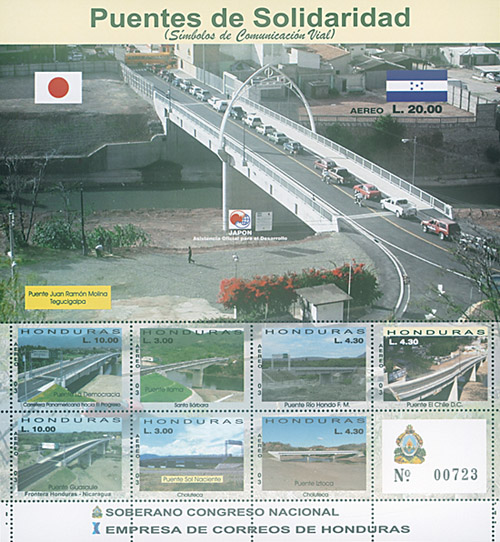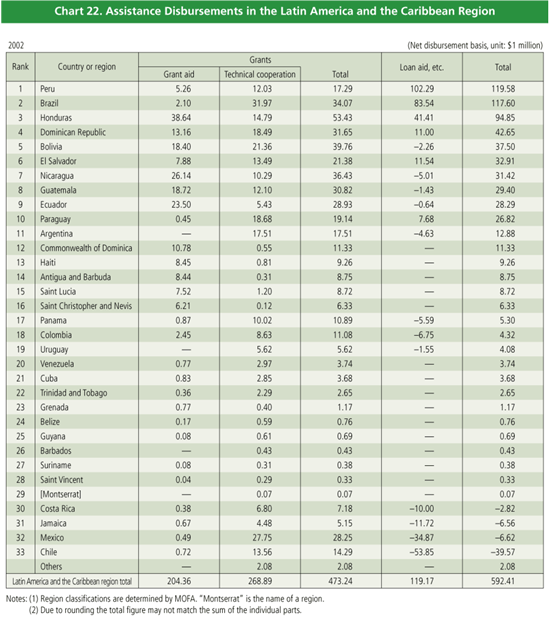

| Part III. | ODA DISBURSEMENTS IN FISCAL YEAR 2002 |
Japan’s bilateral ODA to the Latin America and the Caribbean region in 2002 was approximately $590 million, accounting for 8.8% of total bilateral ODA.
Japan has been carrying out assistance in the Latin America and the Caribbean region placing importance on the following points, as stated in the medium-term policy.
| (1) | Japan will provide active support for the efforts on democratization and economic reform. |
| (2) | Japan will provide support for environmental conservation to protect the natural environment and to cope with the increased environmental burden resulting from economic growth. |
| (3) | Japan will provide support for the alleviation of poverty by assisting basic education programs, health and medical care, agriculture and rural development, and the development of a basic infrastructure for the reduction of regional disparities. |
| (4) | In relatively low-income countries, Japan will provide support for the development of the social and economic infrastructure, etc. in order to revitalize the private sector and promote foreign investment. |
| (5) | Japan will promote regional cooperation, including human resources development and technology transfer, etc. which targets two or more countries. |
Furthermore, Japan intends to give consideration to rehabilitation and reconstruction
support for countries afflicted by natural disasters and to comprehensive
support for the island countries of the Caribbean region.
In the Latin America and the Caribbean region there are some countries that
are still suffering from the effects of the “Argentina Economic Crisis”
of December 2001. However, the region as a whole is generally showing political
and economic stability following the democratization and economic reforms of
the 1990s. There has also been progress toward regional economic integration
such as MERCOSUR (the Common Market of the South) and CARICOM (the Caribbean
Community), and as a part of this, negotiations are underway for the establishment
of the Free Trade Area of the Americas (FTAA) in 2005, which would encompass
all of North and South America. On the other hand, the rapid pace of economic
reforms has created economic disparities within the region and within individual
countries. In some countries, this has led to the worsening of social problems,
such as poverty and the deterioration of public security. In order to reduce
disparities, alleviate poverty, and encourage stable development of the regional
economy, efforts in the BHN sectors that provide the foundations of development,
such as the education and health and medical care sectors, have become issues.
The Latin America and the Caribbean region is also faced with a variety of serious
environmental issues and social issues including the decline of the tropical
rain forests, the environmental degradation in big cities, and the expansion
of slums resulting from the concentration of population in cities.
Regarding Japan’s economic cooperation for the Latin America and the Caribbean
region, traditionally Japan has provided assistance that contributes to resolving
the above issues while giving consideration to the fact that there is a large
number of migrants from Japan and ethnic Japanese living in the region who are
serving as a special connection to Japan, and that the region has achieved high
economic growth in recent years leading to stronger economic ties with Japan.
As for environmental conservation, Japan is actively carrying out cooperation
through both technical cooperation and financial cooperation. For example, Japan
is providing support through technical cooperation for the formulation of plans
for improving water quality, etc. and providing yen loans for environmental
projects to countries with a relatively high level of income. And Japan is providing
grant aid to Guatemala, Nicaragua, Honduras, and other countries to improve
the housing of low-income population and develop the basic living environment
such as the development of the water supply and sewerage systems. As for technical
cooperation, Japan has implemented technical cooperation projects such as the
“Environmental Research and Training Center” in Mexico and the “National
Center for the Environment” in Chile.
 |
| Stamps showing eight bridges in Honduras that were damaged or washed away by hurricanes. The stamps were issued to commemorate the reconstruction of the bridges with grant aid from Japan. |
In addition to the MERCOSUR countries, effective assistance with consideration
given to regional integration is also required for the Central American countries
where efforts toward integration are being advanced and for the Caribbean countries
that form CARICOM. Japan has been making efforts to provide comprehensive support
for the Central American countries and the Caribbean countries and working to
strengthen relations by utilizing the “Japan-Central America Forum for
Dialogue and Cooperation” which is held regularly every year and in accordance
with “A New Framework for Japan-CARICOM Cooperation For the Twenty-First
Century”25 adopted at the First Japan-CARICOM
Ministerial-Level Meeting held in November 2000.
Japan is actively supporting comprehensive environmental projects, projects
that benefit the entire region, post-disaster reconstruction projects and others.
For example, Japan’s environmental measures include the implementation
of the “Project for Strengthening Institutional Capacity of Mining Environmental
Management” (technical cooperation project)” to transfer the technology
necessary for mine information management and measures to close mines in Chile,
which faces the issue of mine pollution from abandoned mines. Projects that
produce benefits within the region include the “Central America Industrial
Technology Center Construction Project (technical cooperation project)”
for Costa Rica and the “Caribbean Disaster Management Project (technical
cooperation project),” which provides cooperation in the disaster management
sector including the creation of hazard maps for floods, landslides, volcanic
eruptions, and earthquakes with the objective of raising disaster prevention
capacity in CARCOM member countries such as Barbados, Saint Vincent, and others.
In addition, Japan is working to promote comprehensive cooperation including
South-South cooperation by more developed countries such as Brazil, Argentina,
and Chile.
 |
Japan’s support for migrants from Japan and ethnic Japanese includes acceptance
of migrants or their children as trainees through emigration programs, and cooperation
for the development of socio-economic infrastructure in specified areas including
migrant areas. Examples of this type of cooperation include the “Construction
of Bridges in Northern Department of Santa Cruz” in Bolivia and the “Constanza
Valley Irrigation Project” in the Dominican Republic.
Beginning with an economic recession in 1998, Argentina fell into the “Argentina
Economic Crisis” in December 2001 and suffered a major blow economically,
socially and politically. As an emergency response package for Argentina, JICA
produced a policy to support economic and social development of the country.
Based on this package, in the economic sphere Japan conducted basic surveys
for the stimulation of small and medium-sized enterprises and the expansion
of exports, in the social sphere Japan implemented pilot projects to support
the socially vulnerable in collaboration with NGOs. Japan also conducted surveys
on the decentralization of public services. Japan intends to provide support
for Argentina to overcome the crisis based on reports from these surveys in
the future.
| Column 7 | Primary School Feeding Project (School Milk Project) | |||
|
In primary schools in Nicaragua, there are still many students aged between seven and 12—the primary school attendance age—who do not attend school in order to work. Many of their parents have a traditional and cultural tendency to put their children to work as a source of income rather than give them educational opportunities. The children who attend school while working have poor nutrition, and it is third and fourth year students that are the most likely not to attend school. That is the current situation of primary education in Nicaragua.
|
||||
25. This framework includes
cooperation in a wide range of sectors including employment creation and the
diversification of industry, vocational training, health and sanitation and
AIDS countermeasures, environmental conservation, strengthening capacity to
respond to natural disasters, tourism, promotion of IT, and promotion of the
fishing industries. For details refer to the MOFA homepage at http://www.mofa.go.jp/mofaj/area/latinamerica/kikan/caricom/kaigi2000.html
(in Japanese).